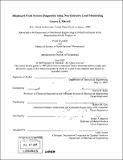Shipboard fluid system diagnostics using non-intrusive load monitoring
Author(s)
Mitchell, Gregory R. (Gregory Reed)
DownloadFull printable version (7.565Mb)
Other Contributors
Massachusetts Institute of Technology. Dept. of Mechanical Engineering.
Advisor
Steven B. Leeb, Robert W. Cox and Henry S. Marcus.
Terms of use
Metadata
Show full item recordAbstract
Systems on modem naval vessels are becoming exclusively dependent on electrical power. One example of this is the replacement of distilling and evaporator plants with reverse osmosis units. As the system is in continuous operation, it is critical to have remote real-time monitoring and diagnostic capabilities. The pressure to reduce shipboard manning only adds to the difficulties associated with monitoring such systems. One diagnostic platform that is particularly well suited for use in such an environment is the non-intrusive load monitor (NILM). The primary benefit of the NILM is that it can assess the operational status of multiple electrical loads from a single set of measurements collected at a central point in a ship's power-distribution network. This reduction in sensor count makes the NILM a low cost and highly reliable system. System modeling, laboratory experiments, and field studies have all shown that the NILM can effectively detect and diagnose several critical faults in shipboard fluid systems. For instance, data collected from the reverse osmosis units for two U.S. Coast Guard Medium Endurance Cutters indicate that the NILM can detect micron filter clogging, membrane failures, and several motor-related problems. Field-tested diagnostic indicators have been developed using a combination of physical modeling and laboratory experiments.
Description
Thesis (Nav. E. and S.M. in Ocean Systems Management)--Massachusetts Institute of Technology, Dept. of Mechanical Engineering, 2007. Includes bibliographical references (leaves 80-81).
Date issued
2007Department
Massachusetts Institute of Technology. Department of Mechanical EngineeringPublisher
Massachusetts Institute of Technology
Keywords
Mechanical Engineering.